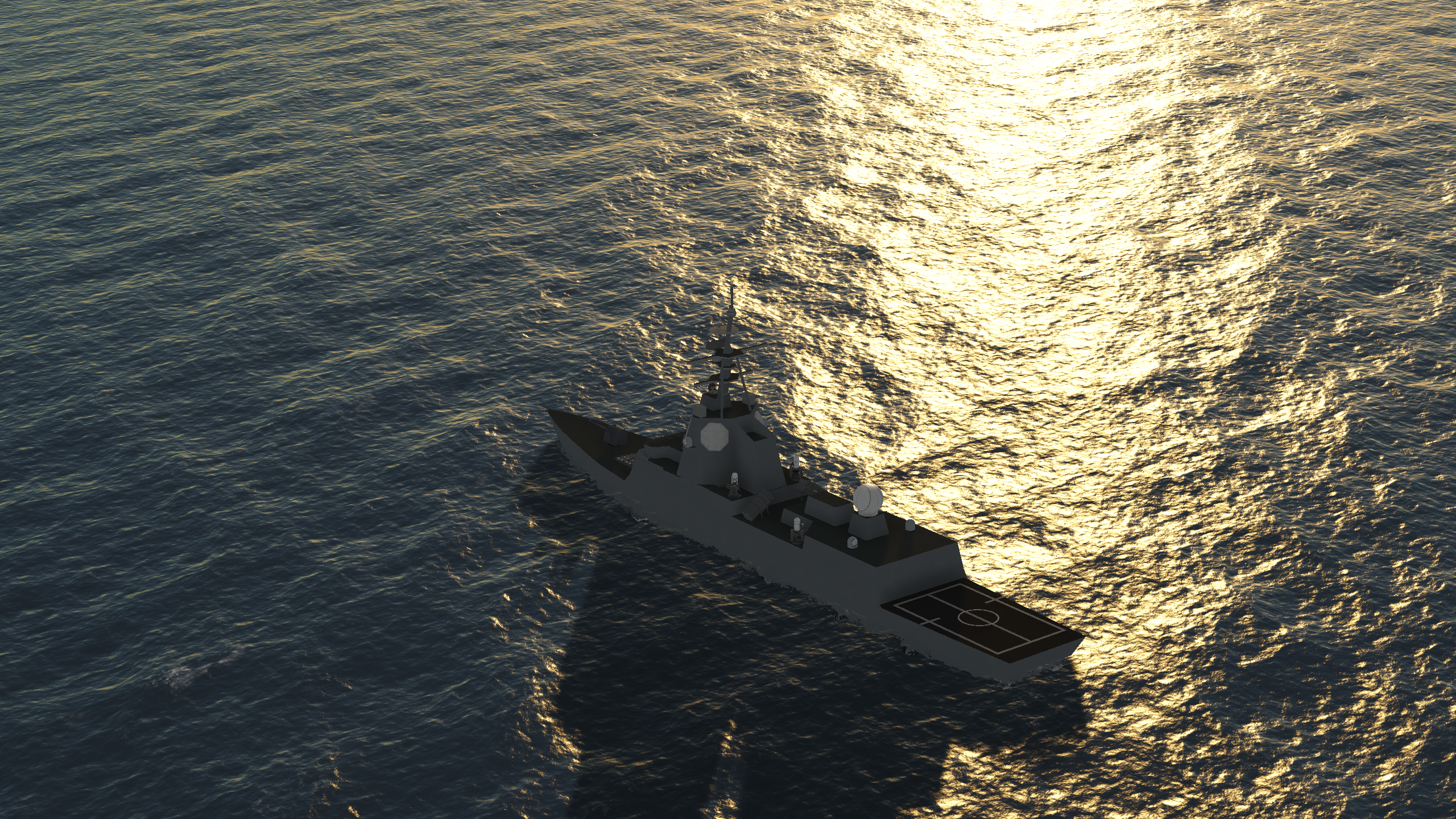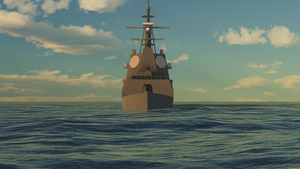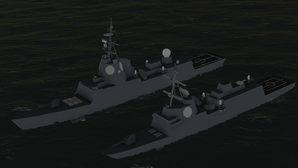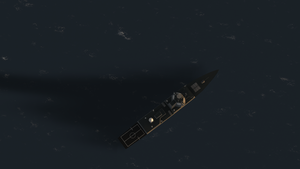Canstana-Class Landing Platform Dock
The Klaes-Haydn Class Cruiser is a class of guided-missile cruisers currently in service in the Imperial Union. While initially designed as an Air Warfare Destroyer, the scope of the project quickly evolved into a much more capable multi-role platform to complement the existing Prometheus-Class AAW Destroyer and the Warspite-Class Cruisers.
|
Klaes Haydn-Class Cruiser
Klaes Haydn-Class Air Warfare Cruiser
|
|||||
|---|---|---|---|---|---|
| Ship | |||||
 |
|||||
| HMS Klaes-Haydn in her maiden voyage | |||||
| Role | Primary Fleet Air Defence | ||||
| National Origin | Imperial Union | ||||
| Production History | |||||
| Produced | |||||
| 2193 - ongoing | |||||
| Designer | VAE Shipyards | ||||
| Unit Cost | 400,000(√) | ||||
| Number Built | 3, 7 on order | ||||
| Service History | |||||
| In Service | |||||
| 2194 - ongoing | |||||
| Used By | Imperial Union Imperial Royal Navy | ||||
| Vessel Characteristics | |||||
| Displacement | 3000 Tons | ||||
| Length | 110 m | ||||
| Beam | 16 m | ||||
| Height | 26 m | ||||
| Draft | 5 m | ||||
| Propulsion | x4 FROSTON Electro Propulsion | ||||
| Max Speed | 29 kn (14.5 m/s) | ||||
| Operational Range | 1800 km | ||||
| Complement | 330 (30 officers, 300 enlisted) | ||||
| Sensors and Processing Systems | FROSTON CRYSTAL Block II SIMPSON Radar System |
||||
| Armament | x1 127mm Naval gun x6 Phalanx CIWS x5 250MW Lazer x64 VLS cells (Strike-length) |
||||
| Planes Carried | up to 4 K-53B VTOL fighters | ||||
Development
The Klaes Haydn-Class began development in 2193 following the success of the Orion-Class Frigate as an evolution of the Air Warfare Destroyer Program to satisfy the IRN's demand for a large AAW cruiser capable of leveraging the newly developed FROSTON CRYSTAL system. Unlike the VSD's affordable frigate design, the Klaes Haydn was designed from the very start without any form of cost-ceiling. This was mainly due to the IRN and the wider armed force's restructuring and drastically increased defence spending under the Imperial Union's New Century Rearmament Act, granting the nation's armed forces close to 50% additional funding incrementally provided over 10 years. As such, the IRN's demand for the new cruiser was expanded upon the already ambitious design to include extensive anti-surface capabilites akin to the IRN's aging Warspite Class. The revised design was submitted for approval in late 2193 and was approved for production before the end of the year.
The Klaes-Haydn Class is the Imperial Union's first non-capital ship to be christened after an individual, being named after Westrayan Admiral Klaes Haydn, who has achieved near-legendary status in the empire's Kafrican territories for his valiant actions in protecting Vocavian refugees whom has escaped from the Avalonian menace across the Vocavian Sea.
Design
In response to growing threats of large cruisers and battleships of near-peer and peer adversaries, the IRN was in dire need of a large surface combatant fully capable of both surface-to-surface warfare as well as advanced fleet air-defence. Said needs are evident in the design of the Klaes-Haydn Class, notably the presence and placement of 4 FROSTON CRYSTAL System arrays. While similar AESA systems are becoming more commonplace in most navies, the Klaes-Haydn class boasts 4 arrays on a single ship, as well as its placement higher up from the sea level. This allows the ship's integrated combat system to detect and track incoming sea-skimming threats far more effectively by effectively negating the horizon-effect at further distances.
Widely regarded as a heavier and more capable cousin to the Orion-Class Frigate, the Klaes-Haydn Class bears many similarities to its smaller counterpart. Due to the two ships being first in Imperial service to field AESA radars and reinforced keel structures, the two classes are seen by many to be the IRN's changing focus towards advanced systems in the newcoming century. The commonaltiies also include the modular generator-propulsion system: the Orion and Klaes-Haydn classes utilise the same FROSTON Propulsion system and Gas Turbine Generator, albeit at different numbers. The modular design allows for easier maintenance and refitting of existing systems, while also lowering the initial cost due to reduced complexity in design.
The Klaes-Haydn class is equipped with 3 M1800 Gas Turbine Generators and 4 FROSTON Electro propusion sytem, mainly to service the characteristically power-hungry FROSTON CRYSTAL system. Two Gas Turbines are dedicated solely for powering the 4 electric motors, while the remaining turbine is reserved for radar and combat systems. However, the 5 onboard laser systems are not connected to the main power network, instead relying on pre-charged capacitors and power banks to sustain their overwhelming power demand.
Armament
Barring capital ships such as battleships and carriers, the Klaes-Haydn Class is the most heavily armed surface combatant in Imperial service, with an impressive load of 4 CIWS mounts, a 127mm naval gun, 5 Advanced 250MW Lasers, 64 VLS cells and 8 AshM canisters. It is also worth noting that all 64 VLS cells located forewards of the bridge are full strike-length, meaning they are capable of storing even the largest and most capable missiles available. Naval experts project the Klaes-Haydn Class to be the main user of the newly introduced LRASM-A and LRASM-B naval strike missiles, mainly due to the class being one of few capable of storing and launching the newly designed heavy missiles.
As a main replacement of the aging Warspite Class, the Klaes-Haydns are also equipped with a fully functioning multi-purpose hangar near the aft of the ship, capable of servicing up to 4 K-53B VTOL strike fighters and 2 multi-purpose RHIBs. However, in a 2197 Defence White Paper, the IRN outlined the possibilites of downsizing the rear hangars in order to mount an additional 32 or 48 VLS strike-length VLS cells to bolster its AAW and ASW capabilities.
Role in the IRN
The initial batch of 3 cruisers immediately relieved the aging Warspite-class cruisers from their role as strike/escort cruisers in the Carrier Strike Groups. The relieved Warspite-classes are currently undergoing review and complete overhauls under the supervision of VAE Systems.
No ships in the class have been in combat as of 2200.


